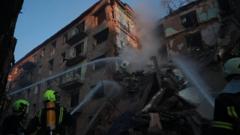As Trump prepares for his first NATO meeting since reelection, global tensions rise after U.S. strikes on Iran's nuclear sites. European allies face pressure to strengthen defense commitments while navigating complicated dynamics with the unpredictable U.S. leadership.**
Anticipation Builds for Pivotal NATO Summit Amid Global Tensions**

Anticipation Builds for Pivotal NATO Summit Amid Global Tensions**
The upcoming NATO summit in the Netherlands, featuring U.S. President Donald Trump, could redefine transatlantic relations and defense commitments against a backdrop of escalating crises.**
As the NATO summit approaches in the Netherlands, all eyes are on U.S. President Donald Trump, making his first appearance at the alliance since his reelection. Recent tensions have surged with the U.S. launching direct strikes on Iran's nuclear sites, prompting a potential military response from Tehran. Amidst these crises, European allies are keen to show their commitment to the alliance, especially as Trump's past comments have criticized NATO members for not contributing enough to their own defense.
A high-ranking diplomat expressed concerns over Trump's strained relations with Europe, noting, “Just weeks ago, it was uncertain whether he would attend.” Echoing this sentiment, the ongoing observation from Moscow and Beijing suggests that their reaction hinges upon the perceived unity, or lack thereof, within the alliance.
NATO Secretary General Mark Rutte has reportedly tailored the summit to appease Trump, emphasizing significant increases in defense spending by European nations, thereby easing concerns over their dependency on U.S. military support. These efforts aim to keep the summit focused on monetary commitments to prevent potential confrontations between Trump and other leaders.
However, the geopolitical landscape has shifted dramatically following Iran's missile strikes targeting U.S. forces in the Middle East. Should Trump choose to remain in Washington's Situation Room, the focus of the summit could inevitably skew towards the escalating tensions with Iran.
Trump has positioned himself for a significant win, anticipating commitments from European nations to spend 5% of their GDP on defense—a demand he has been vocal about since taking office. Interestingly, the effectiveness of such pledges remains uncertain. Spain has recently hinted at receiving an exemption from this ambitious financial target, which may invoke discord among its NATO allies.
As concerns grow over Russia's military capabilities, there's apprehension regarding whether the U.S. would be willing to endorse a declaration identifying Russia as NATO's primary threat. Trust has been shaken, particularly after Trump's mixed signals on relations with Moscow and his approach to managing the war in Ukraine.
The strategic discourse surrounding the summit underscores a fundamental question: Is Europe equipped to assume more responsibility in its defense? With NATO's military presence in Europe, which currently includes 100,000 U.S. troops, there’s an urgent dialogue on enhancing European military capabilities and minimizing reliance on American forces.
Amidst financial commitments, nations like Poland have championed their defense spending, citing their geographic proximity to an aggressive Russia as motivation. The collective European strategy is potentially molded by a range of considerations—cash flow, political landscapes, and the looming issue of increased taxation or welfare cuts to fund military expenditures.
Debates surrounding how best to unify and streamline military resources across Europe are likely to take a backseat at this summit. As European leaders grapple with the implications of shifting defense paradigms, clarity on the trajectory of U.S.-European relations relies heavily on the outcomes of Trump’s participation in the summit.
What remains clear is that the stakes are high. The projections regarding Russia’s potential aggressiveness within five years have made clear that urgency is paramount. As NATO navigates both internal reforms and external challenges, the potential ramifications of this summit could signal either a course of deeper European military independence or reaffirm the U.S.'s crucial role in European security strategy.






















